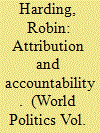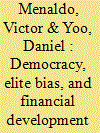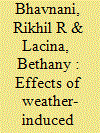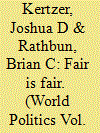|
|
|
Sort Order |
|
|
|
Items / Page
|
|
|
|
|
|
|
| Srl | Item |
| 1 |
ID:
141816


|
|
|
|
|
| Summary/Abstract |
Do voters in Africa use elections to hold governments accountable for their performance in office? In contexts of limited information and weak state capacity, it can be difficult for citizens to attribute the provision of public goods and services to political action. As a result, voters often have little information about government performance on which to condition their electoral support. Such contexts are frequently characterized by clientelism or ethnic politics, and there is a widespread impression that African elections are little more than contests in corruption or ethnic mobilization. Using an original panel data set containing electoral returns and detailed information on road conditions throughout Ghana, the author provides robust evidence that when a public good can be attributed to political action, as is the case with roads in Ghana, electoral support is affected by the provision of that good. The author also uses data on a variety of educational inputs to test the claim that votes are conditioned only on attributable outcomes.
|
|
|
|
|
|
|
|
|
|
|
|
|
|
|
|
| 2 |
ID:
141818


|
|
|
|
|
| Summary/Abstract |
Does democracy induce financial development? There are good theoretical reasons to believe this to be the case, but the evidence adduced to support this claim has been mixed. In this article, the authors posit that only democracies that appeal to the median voter should experience financial development because those democracies have adopted their own constitution after transition, rather than having inherited one from an authoritarian predecessor. The authors empirically test this theory by focusing attention on Latin America, where there have been several reversals and improvements in financial outcomes and where many countries have cycled between regime types. They find robust support for it across different specifications. While popular democracies tend to reform their financial systems, have greater participation in the banking system, increase the supply of credit and reduce its price, and grow their stock markets, elite-biased democracies do not.
|
|
|
|
|
|
|
|
|
|
|
|
|
|
|
|
| 3 |
ID:
141819


|
|
|
|
|
| Summary/Abstract |
Migration is thought to cause sons of the soil conflict, particularly if natives tend to be unemployed. Using data from India, the authors investigate the causal effect of domestic migration on riots by instrumenting for migration using weather shocks in migrants’ places of origin. They find a direct effect of migration on riots, but do not find that this effect is larger in places with more native unemployment. They argue and find evidence that migration is less likely to cause rioting where the host population is politically aligned with the central government. Politically privileged host populations can appease nativists and reduce migration through means that are less costly than rioting. Without these political resources, hosts resort to violence. Beyond furthering the sons of the soil literature, the authors detail a political mechanism linking natural disasters and, possibly, climate change and environmental degradation to riots, and demonstrate a widely applicable strategy for recovering the causal effect of migration on violence.
|
|
|
|
|
|
|
|
|
|
|
|
|
|
|
|
| 4 |
ID:
141817


|
|
|
|
|
| Summary/Abstract |
Numerous recent field and laboratory experiments find that elections cause higher subsequent levels of collective action within groups. This article questions whether effects observed in these novel environments apply when traditional institutions are democratized. The authors test the external validity of the experimental findings by examining the effects of introducing elections in an indigenous institution in Liberia. They use a break in the process of selecting clan chiefs at the end of Liberia’s civil wars to identify the effects of elections on collective action within communities. Drawing on survey data and outcomes from behavioral games, the authors find that the introduction of elections for clan chiefs has little effect on community-level and national-level political participation but that it increases contentious collective action and lowers levels of contributions to public goods. These findings provide an important counterpoint to the experimental literature, suggesting that elections have less salutary effects on collective action when they replace customary practices.
|
|
|
|
|
|
|
|
|
|
|
|
|
|
|
|
| 5 |
ID:
141815


|
|
|
|
|
| Summary/Abstract |
Behavioral economics has shown that people often diverge from classical assumptions about self-interested behavior: they have social preferences and are concerned about issues of fairness and reciprocity. Social psychologists show that these preferences vary across actors, with some displaying more prosocial value orientations than others. Integrating a laboratory bargaining experiment with original archival research on Anglo-French and Franco-German diplomacy during the interwar period, the authors show how fairness and reciprocity matter in social interactions. That prosocials do not exploit their bargaining leverage to the degree that proselfs do helps explain why some pairs of actors are better able to avoid bargaining failure than others. In the face of consistent egoism on the part of negotiating partners, however, prosocials engage in negative reciprocity and adopt the same behaviors as proselfs.
|
|
|
|
|
|
|
|
|
|
|
|
|
|
|
|
|
|
|
|
|